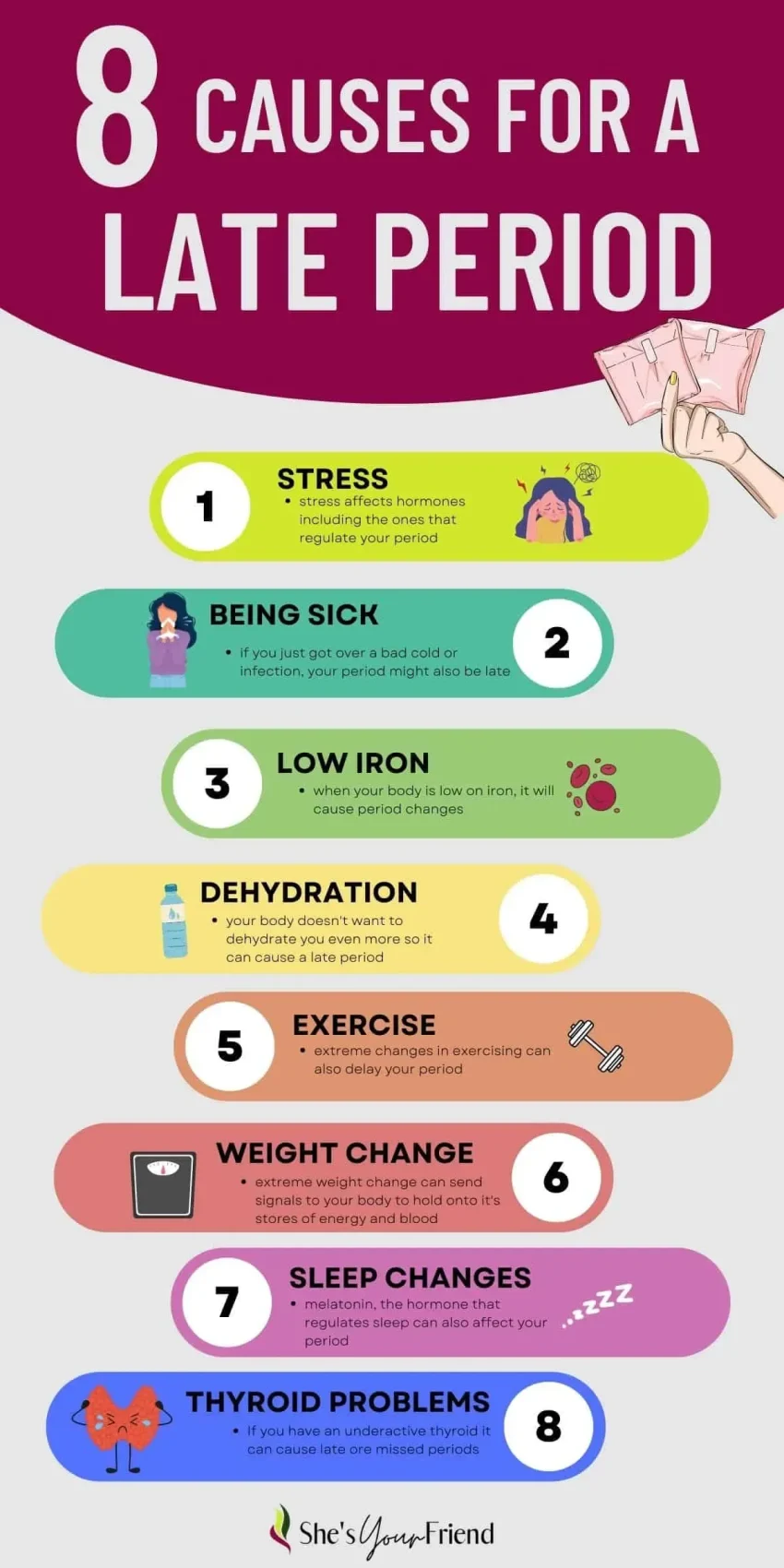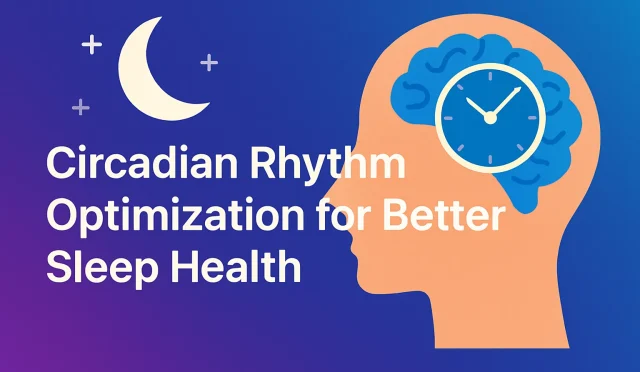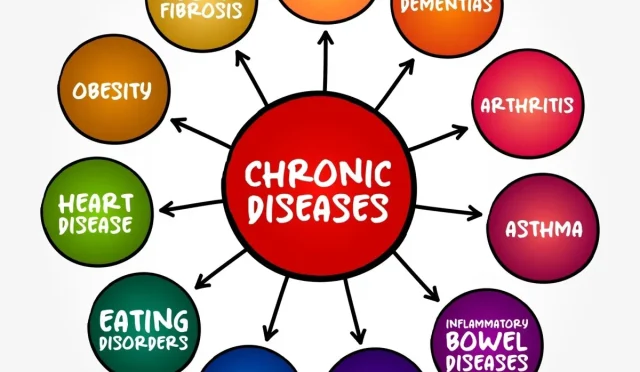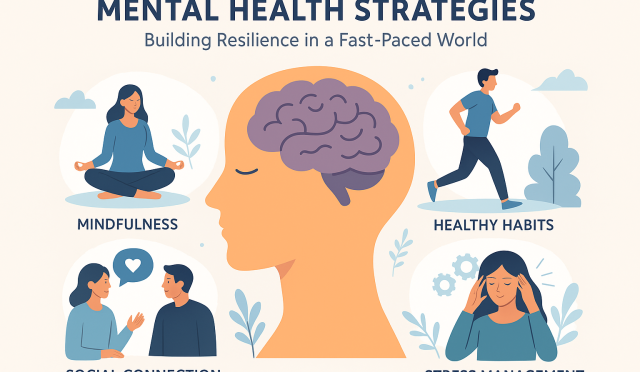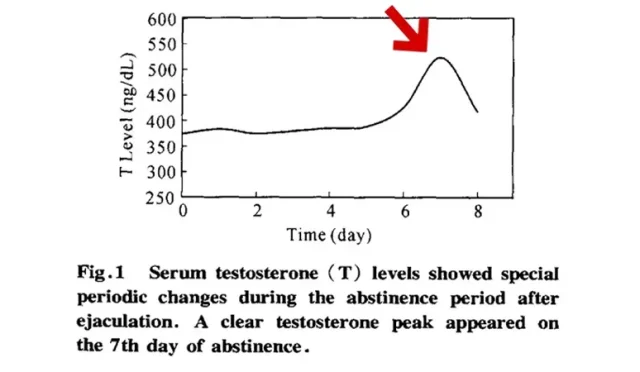A late period can be a source of anxiety for many, often raising the question, “Why is my period late?” There are numerous delayed period reasons that can affect the regularity of your menstrual cycle, ranging from stress and lifestyle changes to underlying medical conditions like polycystic ovary syndrome (PCOS). Understanding the factors contributing to menstrual irregularities is crucial in navigating any alterations to your period cycle changes. From missed period causes linked to diet and exercise to hormonal imbalances, each element plays a significant role in your overall menstrual health. If your period is late, it’s important to identify the cause so you can address any potential health concerns effectively.
When discussing a delayed menstruation, several terms come to mind, including missed periods, irregular cycles, and changes in your menstrual pattern. Variations in the timing and frequency of these cycles can stem from various factors such as lifestyle adjustments, stress levels, and specific health conditions like PCOS. Identifying underlying reasons for a missed period can provide clarity and help pinpoint any necessary interventions. It’s essential to differentiate between normal fluctuations in your menstrual cycle and those that may indicate a need for medical attention. Understanding these nuances can empower you to take better control of your reproductive health.
The Impact of Stress on Your Menstrual Cycle
Stress is a significant factor that can disrupt your menstrual cycle, often leading to a late period. When you’re under pressure or experiencing emotional distress, your body produces higher levels of cortisol, the stress hormone. This hormonal imbalance can interfere with the hypothalamus’s ability to regulate the hormones responsible for ovulation and menstruation, which can result in delayed periods and even missed cycles.
It’s important to recognize the signs of stress and manage it effectively, as chronic stress can have long-term effects on reproductive health. Engaging in relaxation techniques such as mindfulness, yoga, or deep-breathing exercises can help lower stress levels, potentially restoring your menstrual cycle. If stress is affecting your cycles frequently, consider discussing it with a healthcare provider.
Understanding Lifestyle Changes and Period Irregularities
Changes in lifestyle, such as weight fluctuations due to diet or exercise, can significantly impact your menstrual cycle. Rapid weight gain or loss can lead to hormonal changes, affecting ovulation and, consequently, your period. For example, excessive physical training or extreme dieting can suppress menstrual functions and leave you wondering why your period is late or irregular.
Maintaining a balanced lifestyle with a healthy diet and moderate exercise is crucial for menstrual health. If you’ve recently made drastic lifestyle changes, take a moment to reflect on how they might be impacting your body. Consultation with a healthcare provider can help address these imbalances and provide strategies for managing menstrual irregularities effectively.
The Role of Polycystic Ovary Syndrome (PCOS) in Irregular Periods
Polycystic Ovary Syndrome (PCOS) is a common hormonal disorder that can lead to menstrual irregularities such as delayed periods or missed cycles. In women with PCOS, the hormonal imbalance may prevent the ovaries from releasing eggs regularly, leading to infrequent or absent periods. It’s a condition often associated with other symptoms, including weight gain, acne, and excessive hair growth.
If you suspect that PCOS might be affecting your menstrual cycle, it is essential to seek medical diagnosis and guidance. Treatment options may include lifestyle changes, medications like birth control pills, or insulin-sensitizing agents to help regulate your periods and manage symptoms.
Effects of Medications on Menstrual Cycles
Certain medications can influence your menstrual cycle, potentially causing a late period. For instance, hormonal contraceptives are known to regulate your period; however, if you miss a dose or switch to a different method, it can result in changes to your cycle. Additionally, some medications used to treat depression or other health issues may also disrupt hormonal balance, leading to menstrual irregularities.
When taking any new medication, it’s worthwhile to discuss potential side effects with your healthcare provider. They can inform you about any likelihood of menstrual changes and recommend alternative treatments if needed. Regular monitoring of your cycle while on medication is important to identify any significant shifts early.
When to Seek Medical Advice for Late Periods
Recognizing when to consult a healthcare provider regarding a late period is crucial for women’s health. If your late period is accompanied by alarming symptoms such as severe abdominal pain, unusually heavy bleeding, or signs of pregnancy, it’s essential to seek immediate medical attention. These symptoms could indicate underlying health issues that may need prompt treatment.
In addition to severe symptoms, if your periods are consistently delayed by more than seven to nine days or if you experience unusual changes in your cycle, it is advisable to keep your doctor informed. They may perform tests to rule out conditions such as PCOS, thyroid disease, or other underlying health issues that could impact your menstrual health.
Pregnancy as a Common Cause of Missed Periods
Pregnancy is often the most immediate thought when a period is late, especially for those who are sexually active. If conception has occurred, the body will begin to produce hormones that can prevent the shedding of the uterine lining, resulting in a missed period. Missing your period is one of the earliest signs of pregnancy, and it’s advisable to take a pregnancy test if you suspect you might be expecting.
In cases of suspected pregnancy, it is essential to confirm with appropriate testing and, if confirmed, schedule a visit with a healthcare provider for prenatal care. Early intervention and care can ensure a healthy pregnancy journey, and healthcare providers can offer valuable resources to support maternal health.
Exploring Underlying Health Conditions
In some cases, missed periods or irregular cycles can signify more serious underlying health conditions. Issues like thyroid disorders can alter hormone levels, affecting menstrual regularity. Both hypothyroidism and hyperthyroidism are known to have profound effects on menstrual cycles, often leading to changes in flow and timing.
If you suspect that a health condition could be influencing your menstrual cycle, it’s crucial to communicate this to your healthcare provider. They may recommend tests to determine hormonal levels and assess overall reproductive health. Early diagnosis and management can help mitigate future complications related to menstrual irregularities.
Hormonal Imbalances and Their Effects on Menstruation
Hormonal imbalances are a frequent cause of menstrual irregularities. Fluctuations in hormones such as estrogen and progesterone can disrupt the regularity of the menstrual cycle, leading to late periods or skipped cycles altogether. Factors like stress, weight changes, and medical conditions can cause these imbalances, affecting how your body regulates menstruation.
Monitoring your cycle and being aware of any significant changes can help identify potential hormone-related issues early. Discussion with a healthcare provider about any hormonal symptoms, such as mood changes, physical changes, or irregular periods, can lead to tailored treatment options that restore hormonal balance.
Navigating Health Anxiety Related to Late Periods
Experiencing a late period can often trigger anxiety and concern around reproductive health. The uncertainty surrounding menstrual irregularities can lead to increased stress levels, creating a cycle where anxiety exacerbates hormonal imbalances. Understanding these emotions and their effects on physical health is vital to managing both mental and reproductive well-being.
To navigate this health anxiety, consider adopting relaxation techniques and seeking support from friends or professionals. Maintaining open communication with your healthcare provider can also alleviate concerns. Addressing the anxieties surrounding menstrual health can often lead to a clearer understanding and healthier management of your cycle.
Self-Care Tips for Managing Period Irregularities
Incorporating self-care strategies into your routine can be beneficial for managing period irregularities and overall menstrual health. Eating a balanced diet, engaging in regular exercise, and ensuring adequate sleep can positively influence hormone levels, potentially preventing late periods caused by lifestyle factors. Mindfulness practices can also reduce stress, supporting a more regular menstrual cycle.
Keeping a menstrual diary can help track your cycle, making it easier to identify patterns or irregularities. This information can be valuable when discussing menstrual health with your healthcare provider, helping them understand your situation better and offer more tailored advice.
Frequently Asked Questions
What are the common delayed period reasons I should be aware of?
There are various reasons for a delayed period, including stress, weight fluctuations, extreme exercise, hormonal birth control, certain medications, and medical conditions like PCOS. It’s important to monitor your cycle and consult a healthcare provider if you experience significant changes.
How does polycystic ovary syndrome (PCOS) affect my menstrual cycle?
PCOS can cause menstrual irregularities, leading to delayed periods or missed cycles due to hormonal imbalances. Women with PCOS may experience heavier periods or longer gaps between cycles.
What lifestyle changes can lead to menstrual cycle changes and a late period?
Significant lifestyle changes such as increased stress, rapid weight loss or gain, and extreme exercise can disrupt hormonal balance, potentially leading to a late period or missed cycles.
Can medications affect my menstrual cycle and cause a late period?
Yes, certain medications, particularly hormonal contraceptives and antidepressants, can disrupt your menstrual cycle and result in a late period or missed menstruation.
Is it possible for pregnancy to be the cause of a missed period?
Absolutely, pregnancy is one of the most common causes for a missed period, especially in sexually active individuals. If you suspect pregnancy, taking a home test can provide clarity.
What should I do if my period is consistently late or irregular?
If your period is late or regularly irregular, it’s advisable to consult with a healthcare provider. They can investigate potential underlying causes and suggest appropriate steps or treatments.
How does stress impact my late period?
Stress can significantly affect your hormonal balance, which may disrupt your menstrual cycle and lead to a late period. Managing stress through relaxation techniques and self-care may help restore regularity.
What health issues can cause a late period aside from pregnancy?
Various health issues such as thyroid disease, early perimenopause, and primary ovarian insufficiency can lead to menstrual irregularities, including a late period. It’s important to get a professional evaluation if these symptoms persist.
Are there specific foods or drinks I should avoid to prevent a late period?
While extreme dieting can lead to hormonal disruptions causing missed periods, there’s no specific food or drink that is scientifically proven to cause a late period. Focus on a balanced diet for overall health.
When should I seek medical advice regarding a late period?
You should consult a healthcare provider if you experience severe pain, heavy bleeding, unexpected symptoms, or if your late period persists without an obvious reason, as it may indicate a more serious issue.
| Key Point | Details |
|---|---|
| Lifestyle Changes | Stress, diet changes, and extreme exercise can delay periods. |
| Medications and Health Conditions | Conditions like PCOS and certain medications can disrupt cycles. |
| Pregnancy | Missing a period is often linked to pregnancy. |
| Cycle Variability | Normal cycles can vary slightly; significant variations are considered irregular. |
| Consult a Doctor | Seek medical advice if your period is consistently late or accompanied by concerning symptoms. |
Summary
A late period can often raise questions and concerns for many individuals, mainly due to its varying causes ranging from lifestyle changes to underlying health issues. Understanding these reasons provides clarity and reduces anxiety associated with menstrual irregularities. It’s vital to consult with a healthcare provider for personalized advice if you encounter consistent delays in your menstrual cycle.

